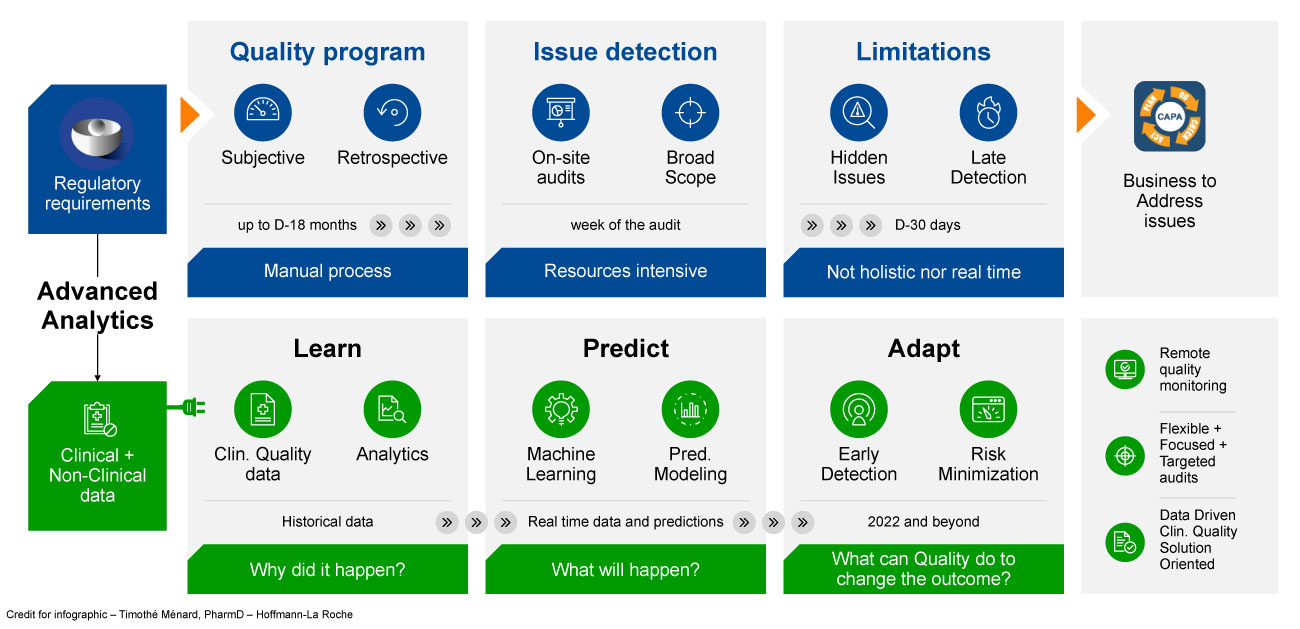The Inter coMPany quALity Analytics (IMPALA) Consortium was initially established in July 2019 as an informal group of biopharmaceutical organizations with the common goal to share knowledge and better understand opportunities in applying advanced analytics for QA.
VISION & MISSION

IMPALA’s mission is to transform the Biopharmaceutical Clinical Quality Assurance process in the Good Clinical Practice and Good Pharmacovigilance Practice areas, by using advanced analytics and promoting the adoption of this new approach and associated methodologies by key industry stakeholders (e.g. pharma quality professionals, Health Authorities) to assure safe use therefore building patient trust, accelerating approvals and ultimately benefiting patients globally.
The IMPALA Consortium will provide the strategic focus for working across the Biopharmaceutical ecosystem to develop and gain industry-wide consensus for the adoption of improved QA using advanced analytics and best practices to be used across the industry.
To achieve these objectives, key projects have been established and are ongoing in focused Work Products.
SCOPE
IMPALA was established in July 2019
WHY ADVANCED ANALYTICS IN CLINICAL QUALITY?
Traditional Quality Assurance relies heavily on manually conducted audits as a means of detecting quality issues and is based on an annual Quality risk strategy. This is extremely resource intensive and provides a point-in-time snapshot of Quality for the limited scope chosen. The time gap between finalizing an annual risk strategy and the conduct of some of the last audits in an annual audit plan means potentially detecting issues up to 18 months late. This late detection of Quality issues and the higher chances of there being hidden issues that may not be identified by an audit, led us to consider if there was a more proactive approach.
With advanced analytics and the use of descriptive/predictive analysis, it is possible to have a much more comprehensive oversight of Quality issues, enabling near-time early detection, follow-up, and resolution. It also enables the conduct of remote audits (which have been invaluable during the pandemic), targeting audits based on robust data analysis and deploying auditing resources wisely. This allows the paradigm shift in Quality Assurance from late detection of issues in an ever evolving drug development landscape to being a true enabler for faster approval, bringing safer drugs to patients.
BOARD
IMPALA Consortium is governed by a Board of Directors consisting of senior-level representatives from across the Founding Member Organizations.
STEERING COMMITTEE
IMPALA Consortium’s Steering Committee oversees the strategy and focus of the work products. The Steering Committee consists of experts within Member Organizations who closely work with the Work Groups to ensure the alignments of objectives, deliverables, and needs of the biopharmaceutical ecosystem.



 Astellas – Vice President, Head of Quality Systems
Astellas – Vice President, Head of Quality Systems
 Bayer Pharmaceuticals – Head of Chief Medical Office Audits
Bayer Pharmaceuticals – Head of Chief Medical Office Audits
 Boehringer Ingelheim Pharma – Vice President and Head of Global Quality Medicine
Boehringer Ingelheim Pharma – Vice President and Head of Global Quality Medicine
 Bristol Myers Squibb – Vice President, Global Head of R&D Quality
Bristol Myers Squibb – Vice President, Global Head of R&D Quality
 Johnson & Johnson – Vice President, BioResearch Quality & Compliance
Johnson & Johnson – Vice President, BioResearch Quality & Compliance




 Novartis – Global Head Governance & Process Excellence
Novartis – Global Head Governance & Process Excellence
 Roche – Vice President, Global Head Product Development Quality
Roche – Vice President, Global Head Product Development Quality
 Pfizer – Vice President, Head of Regulatory Quality Assurance
Pfizer – Vice President, Head of Regulatory Quality Assurance
 Biogen – Global Head of R&D Quality and Compliance
Biogen – Global Head of R&D Quality and Compliance